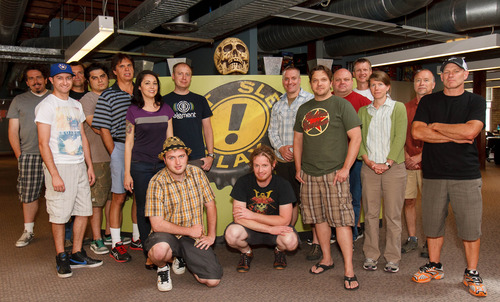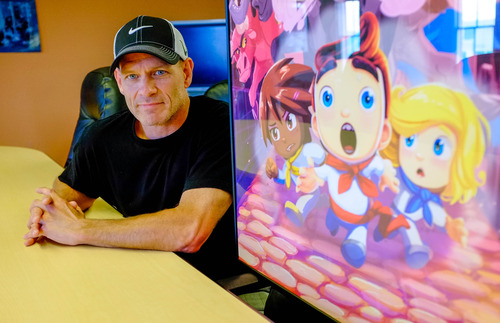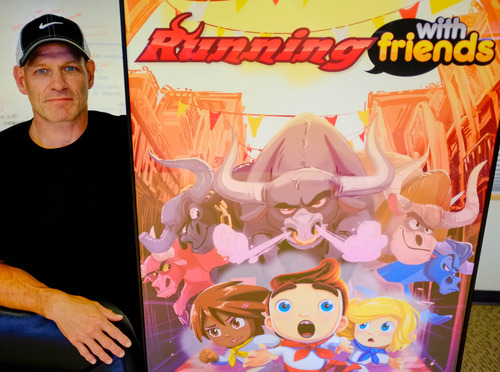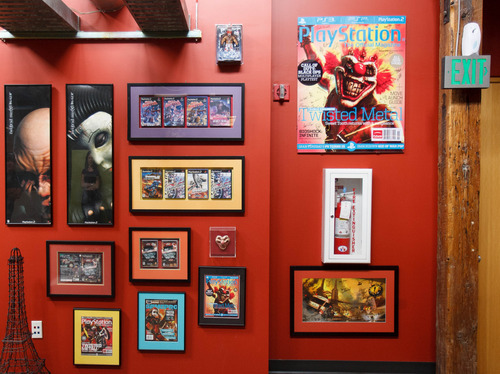This is an archived article that was published on sltrib.com in 2013, and information in the article may be outdated. It is provided only for personal research purposes and may not be reprinted.
Scott Campbell, the president and CEO of Salt Lake City video game studio Eat Sleep Play, saw where the future of gaming was heading.
For nearly two decades, Campbell had been designing games for consoles, from the original PlayStation in 1994 to the PlayStation 3 last year. But of late, the industry was clearly in transition — it was moving from the living-room boxes such as Nintendo Wii and Xbox 360, to tiny screens on mobile phones and computer tablets.
Gaming-on-the-go is now king.
"The decision to move over to mobile — that was an easy decision and an obvious decision, something the whole studio was behind," Campbell said. "But getting there was the challenge. It required changing the entire studio and going from a console DNA to a mobile DNA."
Two weeks ago, Eat Sleep Play released its first mobile game, "Running with Friends," for the iPhone and iPad (an Android version is coming), and it's already a hit. The game rose to No. 1 on the iTunes App Store in its first week of release.
Campbell's company is not the only Utah game studio to change over to mobile game development. Local companies such as Chair Entertainment, Wahoo Studios and EA Salt Lake have all gone from designing games for consoles to creating titles for handhelds. And it's proving to be a profitable move.
Last year, mobile video games generated $31 billion in revenue worldwide, 49 percent of all global video game revenue, according to Digi-Capital, an investment bank focusing on digital companies. By 2016, it estimates that mobile games will produce $48 billion annually, or 57 percent of total global video game sales.
"It's the most exciting time in the gaming industry. It's been a real change in our business," said Jon Dean, executive producer for EA Salt Lake, which also released its first mobile game last week, "Tetris Blitz," for iOS and Android devices. EA Salt Lake also makes "The Sims" games for the PC and family-oriented video games for consoles.
Some local developers already have found huge success in mobile gaming. Chair, which used to produce science-fiction-based games for the Xbox 360, turned to mobile games after it was purchased by Epic Games in 2006. Chair's first two titles for the iPhone and iPad, "Infinity Blade" and "Infinity Blade 2," were hits, both earning $30 million in just over a year.
But the changeover from console to mobile gaming development also involves making difficult decisions.
For one, Eat Sleep Play, which produced the "Twisted Metal" car-combat game for the PlayStation 3, had to get smaller because making mobile games doesn't require as many artists and programmers. When the company broke away from its partnership with Sony to make mobile games, it had to lay off half of its staff at its offices in the Salt Lake City Hardware Building. Its workforce is at 18.
The designers also had to rethink the scope and complexities of the games they were going to make. Console titles can afford big stories and deeper, more complex game play. Casual mobile games require a more pick-up-and-play mechanic that demands little to no learning curve.
To make "Running with Friends," a 3-D game in which the player constantly runs away from bulls in Spain, Eat Sleep Play partnered with San Francisco-based mobile and Web game developer Zynga, which knows a little something about games on the go with such hits as "Words with Friends" and "Farmville."
"The biggest difference mobile phones have provided is the accessibility ," said Travis Boatman, Zynga's senior vice president of mobile. "If you were to hand a traditional video game controller to my mom, she wouldn't know what the shoulder button does, and I would have to explain it to her. But if I handed 'Words with Friends' to her, she would know that she just has to touch the tile and drag it."
Another change that emerged for Eat Sleep Play was that it took four grueling years to make "Twisted Metal" but a little more than a year to make "Running with Friends."
"The development cycles are much shorter. The development budget is significantly lower," Campbell said. "And the cool thing about mobile is that once you release it, you're not really done with it. Once it's live and out in the wild, you can make it better and improve the experience and add content."
Eat Sleep Play plans to release more areas for players to run in for "Running with Friends," as well as more extras.
The rise of mobile gaming also has changed the way publishers sell their games. Many of them release the core game for free but then charge the player anywhere from 99 cents up to $99 for additional content such as powerups that help the player unlock new levels.
That's how "Running with Friends" operates. "Zynga makes the decisions on how in-app purchases will work," Campbell said. "They are good at that — tuning up the economy of the game."
Although designing mobile games has its advantages, the field also has turned into a highly competitive market where just a single programmer in his or her basement can make the next "Great American Game." Fourteen-year-old Robert Nay of Spanish Fork made a hit iPhone game when he released "Bubble Ball" in 2011, which raced to No. 1 on iTunes, supplanting the then-gigantic hit, "Angry Birds."
"There were lots of opportunities for mobile games, and it became very popular to jump over, and there were lots of success stories," said Brent Fox, art director and co-owner of Wahoo Studios in Orem, which makes console and mobile games, including "Kingdom for Keflings." "But for every success story, there were hundreds and hundreds of failures. It's not easy to do."
Eat Sleep Play
Number of employees • 18.
Location • Salt Lake City Hardware Building, 155 N. 400 West.
Past games • "Calling All Cars!" (PlayStation 3), "Twisted Metal: Head On: Extra Twisted Edition" (PlayStation 2), "Twisted Metal" (PlayStation 3)
Newest game • "Running with Friends" (iPhone and iPad)













